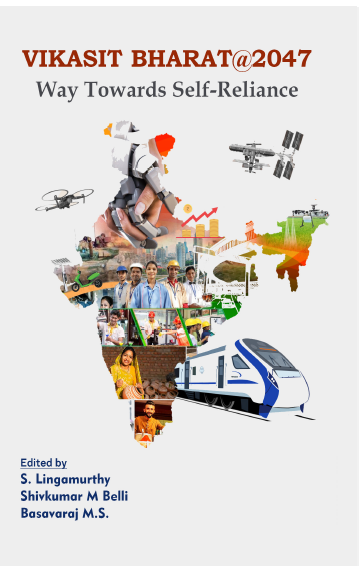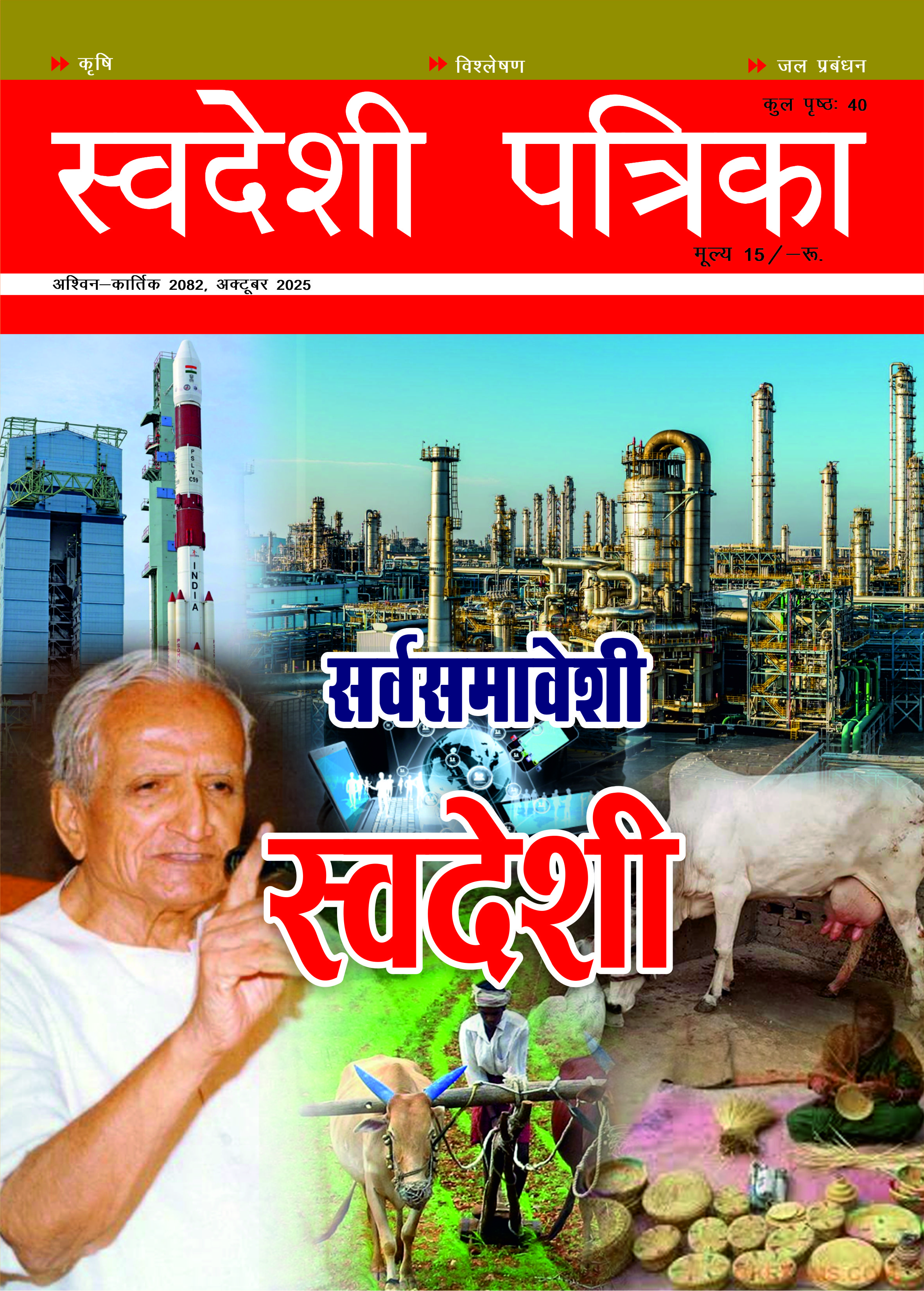
Vikasit Bharat@2047: Way towards Self-Reliance
The Book Vikasit Bharat @ 2047 – Way Towards Self Reliance gives insights to interested Scholars to work in the right direction. — Mahadevayya Karadalli
“VIKASIT BHARAT@2047: Way Towards Self-Reliance” edited by the eminent faculty members from the Central University of Karnataka viz Dr. S Lingamurthy, Dr. Shivakumar M Belli and Dr. Basavaraj M S, published by Samvit Prakashana & Media Pvt. Ltd., Hyderabad with ISBN 978-84-976091-3-8, priced Rs. 600/-.
Honorable Vice-Chancellor of Central University of Karnataka Prof. Battu Satyanarayana, in his preface, rightly pointed out India’s strength, attractiveness as a global Investment destination with a low-cost workforce, demographic dividend, soft and hard power, IT and hardware capabilities, space technology advancement, and utilizing digital technology. He also stressed new strategies in agriculture and the MSME sector to address the problems of climate issues, poverty at the grassroots level, job creation, unemployment elimination, etc. The book has presented outstanding contemporary arguments in 5 parts;
PART-I: Transforming Economy – articles in the first part include the influence and capacity of UPI across the world, the Significance of Digital Payment, solutions for innovative research, the advantage of having vibrant young propulsion (economic powerhouse) and empowering creative youths, were discussed. Since its inception of digital payments (2016), it has offered secure real-time payment and a platform and prioritized inclusive growth. The Bharat has attracted international attention to tackling unemployment, unequal distribution of wealth, and discrepancies in financial literacy among women and rural areas to attain economic sovereignty. Further, time management, skill training for the Bharatiya workforce, ensuing all-round cooperation among stakeholders, methods of ensuing socio-cultural-economic progress, etc., ultimately achieve the aim of Vikasit Bharat.
PART-II: Enterpreneur’s Insights - Second part discussed practical experiences of entrepreneurs, about Artificial Intelligence, FDI, improved infrastructure, alleviate the impacts of climate change, adoption of sustainable renewable energy, intense focus on manufacturing and service sector to promote balanced and sustained economic growth of Bharat.
PART-III: Tech Mobility - in third part analyzing the impact of Electric Vehicles (EVs), using advance battery technology, erecting quick and instant charging centers, technological breakthrough ideas to address the problems of road safety, traffic congestion, pollution. Further, the ideas like reducing greenhouse gas emissions, enhance public health in accordance with set goals of Vikasit Bharat were properly discussed.
PART-IV: Cultural Economy – the fourth part is dedicated to Cultural Economy and Cultural Nationalism. The role of temples in building samruddh (Self-sufficient) Bharat economically and promoting a cultured, civilized economy and society. Temples are the source of abundant cultural and moral values with economic integration. The contribution of temples with Sanatan (Ancient) traditions helps to support socio-cultural activities for leading a happy and satisfied life. Temples in Bharat play a critical role and help generate significant revenue through cultural tourism. Temple Mela is a platform for doing business for rural artisans and women entrepreneurs, for cultural activities such as play homes for children, drama, and music concerts, Bhajan teams are also the source for various economic activities, creating job opportunities for the people, where even government cannot provide jobs such as beggars, orphans in rural areas temples offer them food, dress, and shelter in the form of ‘Dasoha.’ Thus, temple ‘Darshana’ and tourism can boost all types of economic activities.
Part-V: Economic Revival of the States - In this section, research studies highlight the significance of quality governance in providing vital insights to policymakers to promote inclusive growth for Vikasit Bharat. To enhance self-sufficiency in all fields and build Swalambi and Swabhimani Bharat. This section also addresses the equal importance of every state performing along with the country in all sectors of the economy.
The focus of various central government schemes such as PM Kisan, MSME, the Vocal for Local, ‘Make in India’, and Atma Nirbhara Bharat for the upliftment of the poor and downtrodden was discussed. Further, it has analyzed the performance of various sectors, such as the public and private sectors, and fiscal trends.
The Vikasit Bharat is a comprehensive strategic plan with Yuganukul Bharatiya Thought Process, the Cultural Nationalism to ensure economic stability, sustainable development, and an eco-friendly environment to make Bharat a Vishwa Guru. Sanatana Bharatiya values such as ‘Let all be happy’, ‘let all be free from disease’, ‘let all see auspicious things’, and ‘Let nobody suffer from grief’ is the ideal thought for the whole world (daily prayer), and ‘Loka Smasta - Sukhino Bhavantu’ is to be practiced.
Bharat’s ideal Model of Development ensures acquiring of wealth and fulfillment of desired without violating Dharma the righteousness. Artha (acquiring of Wealth) Kama (fulfil desires). inclusive of Dharma which leads to Satisfaction, Happiness and contentment. Artha and Kama are to be fulfilled in tune with Dharma which are necessary to achieve peace and harmony among society and nations. The concept of ‘Sarva Saprashi and Sarva Vyapi’ development is a Holistic approach of Samagra Vikas. In Shikshavali Om Sahana vavatu, Sahanau Bhunaktu, Saha viryam Karavavahe, Tejasvina Vadita Mastu. Om Shanti Shanti Shanti. “May God protect us together, May God nourish us together, may we work conjointly with great energy, may our study be vigorous and effective, may we not hate anybody, Let there be peace, peace and peace. To achieve Samagra Vikas, that is, Vikasit Bharat conditions enumerated in Kautily’s Artha Shastra, the Ruler Shall feel happiness in the happiness of the people’s Happiness King’s welfare in the welfare of the People. King shall consider the interest of his people as his interest. Following the footprints of our Sanatan thought process, we will use the Bharat the Vikasit, i.e., Shining Bharat for the welfare of Mankind.
The learned contributors presented the ideals of Vikasit Bharat through self-reliance through their articles in a thought-provoking and easy-to-understand style. We hope This compilation of Vikasit Bharat @ 2047 and the efforts of the Economic Department and central universities will be a landmark/milestone in the history of building the Bhavya Divya Bharat. The basic aspect of Samagra Vikasit Bharat is to safeguard the interest of mankind of the whole world. The essence of Samaga Vikas lies in a stateless society that is in existence in the hoary past as described: “There was neither kingdom nor the king, neither punishment nor the guilty to be punished, People were acting according to Dharma and thereby protecting one another.” I hope future Researchers work on the project by adding values like Ahimsa (Nonviolence), Satya (truthfulness), Asteya (not acquiring illegitimate wealth), Shaucham (purity), and Indriayanighrah (control of senses) (Manu smriti).
The Articles were edited and arranged in a systematic manner for a better understanding of the Vikasit Bharat concept, which is the brainchild/vision of our beloved Prime Minister Sri Narendra Modi. Further, PM nourished his thoughts in multiple dimensions. This book shall be a stepping stone to understanding the thoughts of the Central Government and ways to achieve the goal at the earliest.
The Book Vikasit Bharat @ 2047 – Way Towards Self Reliance gives insights to interested Scholars to work in the right direction. This compilation may be a reference book for those who want to work continuously on the subject. Articles in Each Part may become stepping stones to move ahead. Making value additions to the Vikasit Bharat @ 2047 model will make the Bharat Vikasit model more acceptable to all developing nations.


